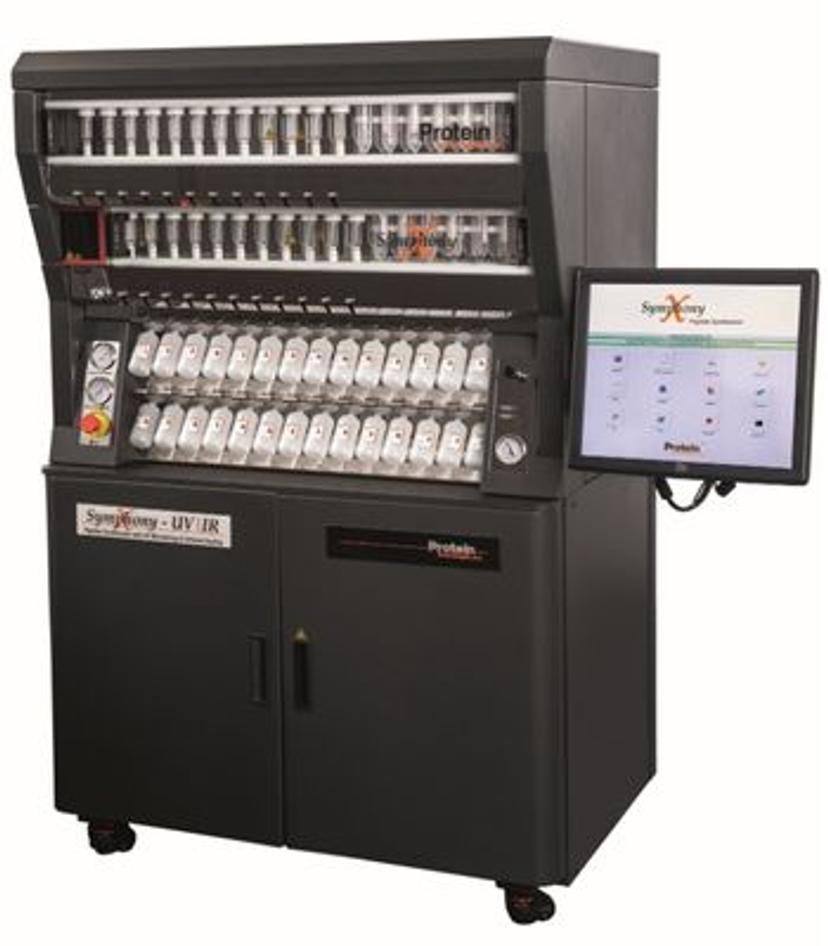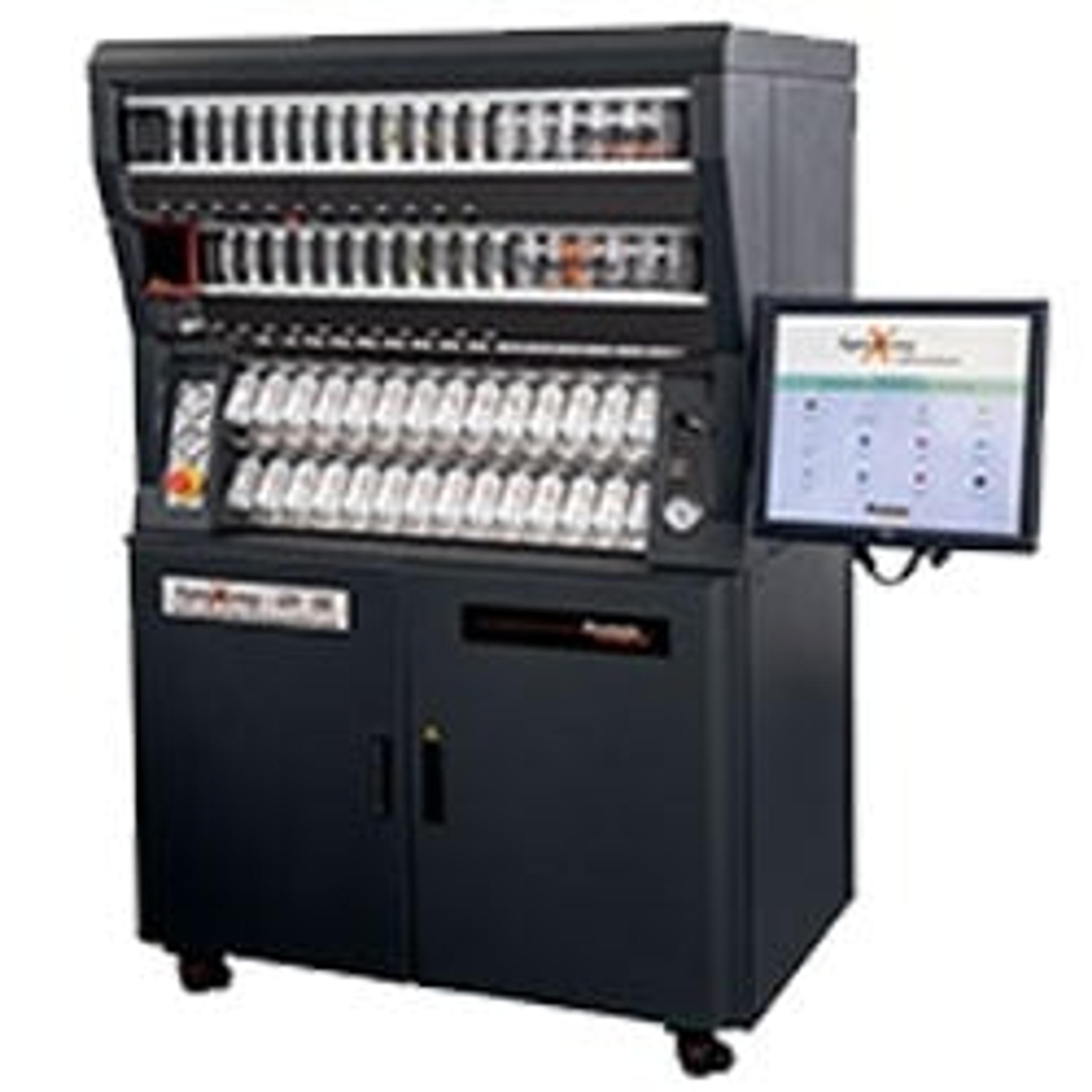Custom peptide manufacturing: Flexible peptide synthesizers supporting a range of applications
The creation and manufacture of custom peptides can be complex – specialist companies can help, removing the need for in-house expertise
21 Feb 2023
Custom peptide manufacturing can be incredibly challenging, with complex processes and many variables to consider. Especially for a laboratory without the right expertise or equipment, the process may be daunting. Fortunately, there are specialist companies that can support in the synthesis and manufacture of custom peptides to support a range of research. High-quality equipment that meets the complex and variable needs of these protocols are essential to their success.
In this article, we speak with Dr. Karine Puget, CEO of GENEPEP, a company specializing in the synthesis of custom peptides, and Luísa Aguiar, Field Application Specialist EMEA for Gyros Protein Technologies. We discuss the challenges of peptide synthesis, and how the Symphony® X and PurePep® Sonata®+ from Gyros Protein Technologies can provide reliable solutions.
Synthesizing peptides for a variety of needs
Custom peptides have uses in a wide range of industries and research areas, including therapeutics, biochemistry, and cosmetics. GENEPEP’s service is essential to laboratories, as it provides them with high-quality custom synthesized peptides without requiring them to have the expertise or resources to do so themselves. As Puget explains, “The majority of our customers are biologists, so they want to externalize the chemistry processes as they may lack expertise and personnel. We know how to accelerate their processes, they don’t have to finance the process or invest in people, and we can follow our customers on any step of their process.”
Aguiar elaborates on some of the challenges of peptide synthesis, and why laboratories may seek external support, “Something we always hear regarding peptide synthesis is that ‘each peptide sequence is unique’. There’s no universal truth regarding the coupling strategy one should use. The choice or coupling reagent, deprotection strategy, the reaction times – all of this has an impact on the outcome of the syntheses.”
“Moreover, even if a strategy works at a small scale, it does not necessarily mean that it will work the same way after we upscale the synthesis; hence, it is important to have a good process transfer from small to large scale.”
GENEPEP works in a variety of peptide synthesis scales, tailored to suit the needs of their customer. Puget elaborates, “We work until the pre-clinical phase, from milligrams to hundreds of grams. This is a critical phase in which there’s a high chance of failure in the selection of the molecules, so our service is crucial.”
The solutions and equipment provided by Gyros Protein Technologies are a key aspect of the success for GENEPEP. With many variables coming into play with peptide synthesis including the complexity of the production process and the potential cost of reagents, excellent equipment and processes are essential. Aguiar explains why the solutions from Gyros Protein Technologies in particular are vital, “Some peptide chemists use very expensive reagents, that they wouldn’t dare use in equipment with fear of wasting it (e.g., fluorescent tags, in-house synthesized monomers, pseudo-prolines, etc.) – for that, we have the single-shot solution, which allows for the delivery of a special reagent with virtually zero dead volume.”
The high quality and massive flexibility of this equipment allow customers to take peptide synthesis further, as Aguiar explains, “Some customers are now starting to work with peptidomimetics, peptide nucleic acids or oligonucleotides – they can easily start doing that using our instruments with little effort.”
Quality and consistent peptides with the Symphony X and PurePep Sonata+
Two of these flexible solutions for peptide synthesis from Gyros Protein Technologies are the Symphony X and PurePep Sonata+. GENEPEP utilizes both of these for their different strengths. One particular difference that supports GENEPEP’s work is the quantities of peptides that can be synthesized, Puget explains, “We use the Symphony X when we have small quantities of peptides, a few milligrams up to 100 mg of the peptide. When we need to reach grams to hundreds of grams we use the PurePep Sonata+. The range that we use on the PurePep Sonata+ is 10–50 mmol at once, on Symphony X, we use up to 0.25 mmol per reaction vessel (RV). When you work on large quantities, you need to have a high level of reproducibility, and this is something both Symphony X and PurePep Sonata+ have managed to demonstrate.”
When you find a good protocol, you can just stick to it, and run over and over again.
Dr. Karine Puget GENEPEP
Both of these systems provide users with the flexibility required for peptide manufacturing. For example, “a lot of CRO or CMO customers choose to use two different coupling solutions for each AA (i.e. a double coupling), ensuring the efficiency of the coupling step. This can be done in the Symphony X, and then upscaled in the Sonata+, with an efficient process transfer,” expands Aguiar.
“The flexibility – both in terms of software and hardware capability – of these instruments make them ideal for researchers to explore different molecules for their projects, as they can easily synthesize not only peptides but also peptidomimetics, foldamers, PNAs or oligonucleotides,” Aguiar continues. “Symphony X is also ideal for optimizing a synthesis methodology, as you can synthesize the same peptide with up to 12 different reactional conditions at the same time, and study the effect of heat during this process optimization. Moreover, you can either synthesize 24 different peptides or up to 24 mmol of the same peptide, rendering it a very efficient instrument.”
The instruments have worked well for GENEPEP, with their consistency ensuring good performance, Puget explains, “It’s a good investment if you have lots of peptides and, on Sonata+, the reproducibility is really good. When you find a good protocol, you can just stick to it, and run over and over again.”
The potential uses for custom peptides are increasing, with more industries realizing their potential and seeking to employ them in their research. “The market is increasing, we expect peptides to be in higher demand and to be the molecules of the future,” explains Puget. And companies like GENEPEP, with the support of manufacturers like Gyros Protein Technologies, will be working to meet their needs and advance their research. Puget concludes, “What the customers are looking for is quality, quantity, and reproducibility, with Gyros Protein Technologies systems we have them all.”

